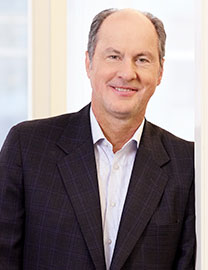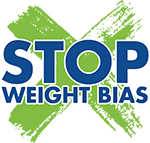 Please tell us your name, title and what your area of focus is at your company.
Please tell us your name, title and what your area of focus is at your company.
Gary D. Foster, PhD, WW International Inc Chief Scientific Officer. As the chief science officer at WW, I oversee the science-based and science-proven program, all clinical research initiatives to advance behavior change and wellness science, and continued program advances. I also lead the Science team in translating clinical research so it’s accessible and actionable for everyone, and partnering across the organization to root solutions in science as experiences, features, partnerships, and strategies are developed.
Why did your company support the Stop Weight Bias Campaign?
Weight stigma is a global problem that can have a negative impact on emotional and physical wellbeing, and impair health. At WW, we firmly believe weight stigma is unacceptable and we are passionate about tackling it. As a global leader in weight loss and wellness, we have an important role to play. We are in a position to help find solutions to combat weight stigma and empower those affected by it.
We know from research that weight stigma is counterproductive to people’s efforts to lose weight and get healthy – That is why we partnered with Dr. Rebecca Puhl, Deputy Director for the Rudd Center for Food Policy & Obesity and Professor in the Department of Human Development and Family Sciences at University of Connecticut, to work on the largest weight stigma study to date – a global research project among our members on the effects of weight stigma and effective ways to cope with it.
By raising awareness and conducting this research we hope to better understand the psychosocial and weight-related health consequences of weight bias, factors that lead people to internalize weight bias, and identify coping strategies and tools to apply when dealing with the effects of weight stigma and internalized weight bias.
What would you tell someone that has been impacted by weight bias?
Weight bias occurs in a context, not a vacuum. Even if we disagree personally, Western cultures inherently value bodies that are thinner, leaner, or the “right” shape. There is a widely-held assumption that higher weight is less attractive and reflects a personal weakness, low motivation, or a lack of knowledge. In other words, we live in a weight-biased society. Viewing weight as reflective of a person’s worth or character and thinking about weight management as simply a matter of “self-control” or “willpower” is not only nonsense – it also minimizes the normal challenges everyone faces when taking strides to get healthier. Weight-biased attitudes are found in the media, doctor’s offices, classrooms, and in workplaces. And the most common reported experience of weight bias occur in familial relationships.
It is not surprising that for many people, weight is a sensitive issue. Living in environments that promote weight biased beliefs can lead people to start viewing themselves in these negative and stereotypical ways. These beliefs are not only false, but are detrimental to people’s physical & emotional health. It’s a common misperception that negative attitudes about weight will be “motivating” – but research clearly shows that they actually lead to barriers that interfere with weight management.
Perpetuating and internalizing biased views about weight and shape has a negative impact on people’s efforts to eat healthier, to move more, and to think in ways that support the weight loss and wellness journey. Science tells us if you are coming from a position of strength, rather than weakness, you will be more likely to succeed. This is especially true for being successful achieving wellness goals, including weight loss.
Instead of perpetuating bias based on weight, we believe that acknowledging the very real challenges so many people are facing with respect and dignity is what is required. WW believes that wellness is about more than what’s on the scale. It’s about having a healthy pattern of eating that includes foods you love, being active in ways that feel good, and thinking in ways that help you feel confident and in the driver’s seat so you can reach your goals. It’s about taking care of yourself in all aspects of your life. We help our members focus on these positive actions that we can all take to improve our health and wellbeing.
What else does your company do to help stop weight bias both internally and externally?
We know that the science in this space is still emerging – effective behavioral treatment approaches are only just being developed and tested to help people manage the stigma they face. We also know that this is a sensitive issue and can invoke negative feelings because some people internalize weight bias and blame themselves. It is complicated and challenging.
Our mission is to:
- Open conversation and raise awareness with our staff and members about weight stigma and its damaging effects
- Contribute to positive changes in society through research – building the science of understanding experiences and finding solutions
- Collaborate with others to challenge weight stigma in our society (like supporting this campaign)
Here are a few practical examples of what we are doing to help stop weight bias:
- We choose our words carefully. We avoid messages that overtly or subtly convey weight bias. We are committed to using non-judgmental and non-biased language.
- We speak up. In 2019, Nike got flack on social media for using mannequins that represent bodies outside of western culture’s “thin ideal.” Our CEO, Mindy Grossman, disagreed with the expressed sentiments expressed and spoke up. And during the COVID-19 pandemic, many memes arose on social media that “humorously” depicted people gaining weight using negative stereotypical images and language. The WW Science team spoke up about these images and received overwhelmingly positive, supportive feedback from Coaches.
- We support global research on weight bias. We partner with external experts (such as Rebecca Puhl and Rebecca Pearl) and recently published data on the largest weight-stigma study ever conducted, which included nearly 20,000 of our own WW members!
- We train our Coaches. How weight stigma shows up can be nuanced – so we help our Coaches recognize it, avoid language that is based in it, understand how it impacts members, and feel inspired and empowered to address it.
- We don’t prescribe a “goal” weight. There is no precise “right” weight for any one person. Research shows that people with medically defined excess body weight experience significant health benefits from 5-7% weight loss, even if their body weight remains above the “healthy” range. We encourage members to set goals that matter to them – whether they are related or unrelated to the scale.
- We celebrate diverse body types. Among our many behavior change techniques includes strategies focused on body acceptance, body positivity, and encouraging self-compassion.
- We collaborate with like-minded others. We support advocacy groups like the OAC & ECPO to support initiatives to challenge weight stigma and find solutions and are a signatory on global Pledge to Eradicate Weight Stigma





